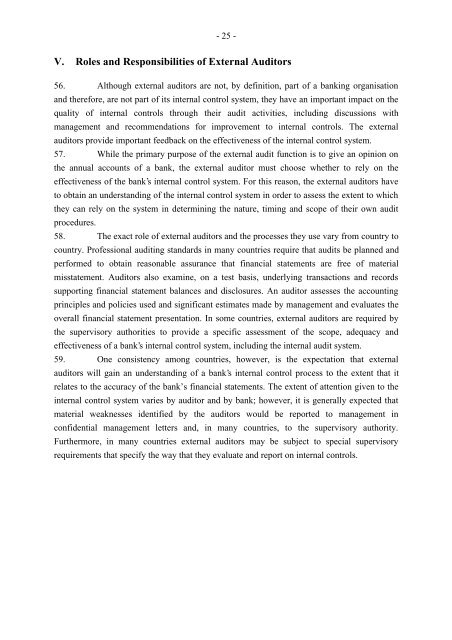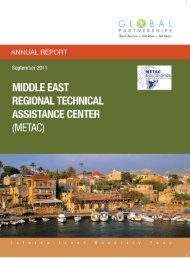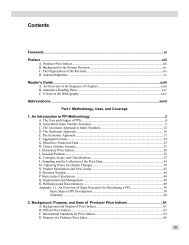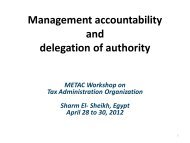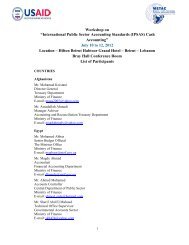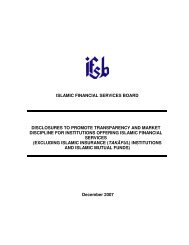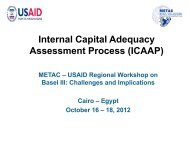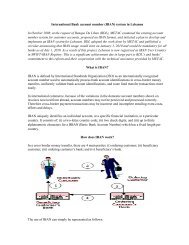Framework for Internal Control Systems in Banking Organisations
Framework for Internal Control Systems in Banking Organisations
Framework for Internal Control Systems in Banking Organisations
Create successful ePaper yourself
Turn your PDF publications into a flip-book with our unique Google optimized e-Paper software.
- 25 -<br />
V. Roles and Responsibilities of External Auditors<br />
56. Although external auditors are not, by def<strong>in</strong>ition, part of a bank<strong>in</strong>g organisation<br />
and there<strong>for</strong>e, are not part of its <strong>in</strong>ternal control system, they have an important impact on the<br />
quality of <strong>in</strong>ternal controls through their audit activities, <strong>in</strong>clud<strong>in</strong>g discussions with<br />
management and recommendations <strong>for</strong> improvement to <strong>in</strong>ternal controls. The external<br />
auditors provide important feedback on the effectiveness of the <strong>in</strong>ternal control system.<br />
57. While the primary purpose of the external audit function is to give an op<strong>in</strong>ion on<br />
the annual accounts of a bank, the external auditor must choose whether to rely on the<br />
effectiveness of the bank’s <strong>in</strong>ternal control system. For this reason, the external auditors have<br />
to obta<strong>in</strong> an understand<strong>in</strong>g of the <strong>in</strong>ternal control system <strong>in</strong> order to assess the extent to which<br />
they can rely on the system <strong>in</strong> determ<strong>in</strong><strong>in</strong>g the nature, tim<strong>in</strong>g and scope of their own audit<br />
procedures.<br />
58. The exact role of external auditors and the processes they use vary from country to<br />
country. Professional audit<strong>in</strong>g standards <strong>in</strong> many countries require that audits be planned and<br />
per<strong>for</strong>med to obta<strong>in</strong> reasonable assurance that f<strong>in</strong>ancial statements are free of material<br />
misstatement. Auditors also exam<strong>in</strong>e, on a test basis, underly<strong>in</strong>g transactions and records<br />
support<strong>in</strong>g f<strong>in</strong>ancial statement balances and disclosures. An auditor assesses the account<strong>in</strong>g<br />
pr<strong>in</strong>ciples and policies used and significant estimates made by management and evaluates the<br />
overall f<strong>in</strong>ancial statement presentation. In some countries, external auditors are required by<br />
the supervisory authorities to provide a specific assessment of the scope, adequacy and<br />
effectiveness of a bank’s <strong>in</strong>ternal control system, <strong>in</strong>clud<strong>in</strong>g the <strong>in</strong>ternal audit system.<br />
59. One consistency among countries, however, is the expectation that external<br />
auditors will ga<strong>in</strong> an understand<strong>in</strong>g of a bank’s <strong>in</strong>ternal control process to the extent that it<br />
relates to the accuracy of the bank’s f<strong>in</strong>ancial statements. The extent of attention given to the<br />
<strong>in</strong>ternal control system varies by auditor and by bank; however, it is generally expected that<br />
material weaknesses identified by the auditors would be reported to management <strong>in</strong><br />
confidential management letters and, <strong>in</strong> many countries, to the supervisory authority.<br />
Furthermore, <strong>in</strong> many countries external auditors may be subject to special supervisory<br />
requirements that specify the way that they evaluate and report on <strong>in</strong>ternal controls.


